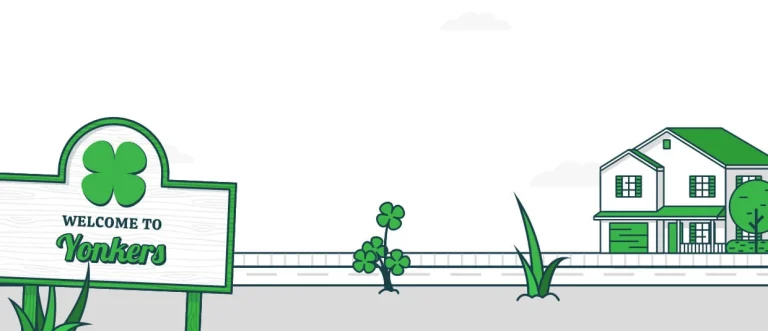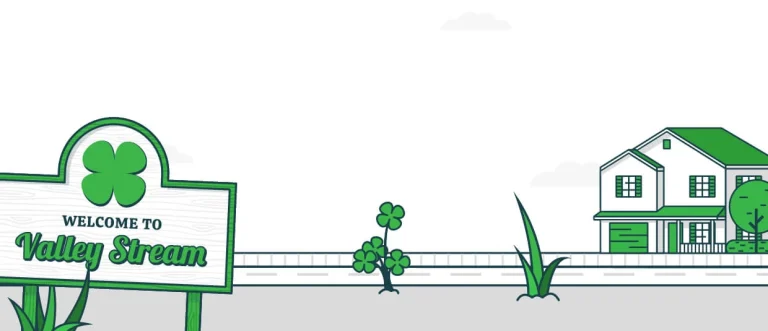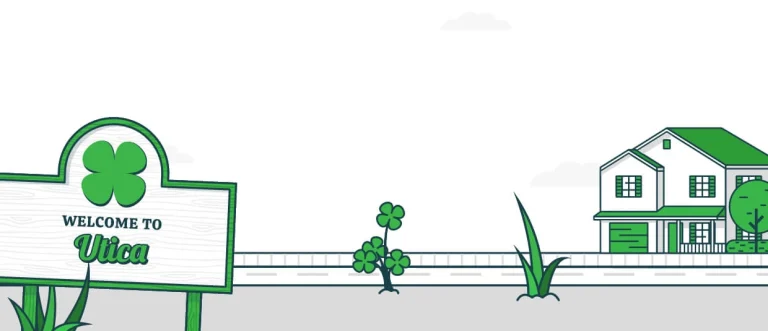Every state regulates its insurance companies to some degree. Every provider has certain rules and regulations it needs to follow., usually regarding communications with customers about policy changes and the claims process.
North Carolina is a diverse, beautiful state. If you’ve got a home in North Carolina, you probably don’t want anything bad to happen to it.
The best way to financially protect your home and property is with the right homeowners insurance. Use this guide before shopping for home insurance in North Carolina to learn about average costs, factors, and more in the Tar Heel State.
How Much Is Homeowners Insurance in North Carolina?
The average price of homeowners insurance in North Carolina is about $1,900 per year for $250,000 of dwelling coverage. The cost of homeowners insurance will vary for every person based on many factors, one of the largest being replacement cost – your home’s physical value.
The bigger and more expensive your home is, the more dwelling coverage you need. The more dwelling coverage you need, the more you’ll pay for homeowners insurance. Look below at the average homeowners insurance in North Carolina at different home price points.
| Dwelling Coverage | $200,000 | $250,000 | $300,000 |
|---|---|---|---|
|
Annual Premium |
$1,757 | $1,900 | $2,290 |
Due to recent inflation and other factors, the median home value in North Carolina has shot up to over $300,000. While replacement cost isn’t exactly the same as your home’s market value, you still might expect to pay on the higher end as home insurance costs increase, as many other things have.
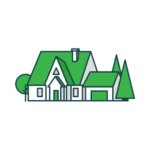
It’s Time to Switch Your Homeowners Insurance
We partner with the nation’s top homeowners insurance companies so you can get a custom policy at an affordable price.
What to Know About North Carolina Homeowners Insurance Rate Increases
Insurance companies work with their state of business to discuss rate increases as needed. In June of 2022, North Carolina authorized a rate increase for many homeowners in the state. New or renewing policies after June 1 will see a statewide increase of 7.9%, although it could be less or more depending on your exact area.
Many residents on the coast or in areas with greater storm damage risk saw increases of 9.9%. These places include the beaches and coastal areas of Currituck, Dare Hyde, Brunswick, Carteret, New Hanover, Onslow, and Pender counties, and many more.
Many residents in the Piedmont Triad area should have experienced a 5.9% rate increase, giving a statewide increase to the average cost of home insurance in North Carolina between the two numbers at 7.9%. Note, though, that these increases are on top of the other rate increases that you may experience regardless due to storm damages, inflation, changes to your property, and other rate increases your provider had planned for your upcoming policy term.
No one wants to see their North Carolina homeowners insurance rates increase, but you might take comfort in the fact that the original rate increase that was proposed was 24.5%, but it ended up being only 7.9%, according to the governor.
In 2024, insurers again wanted to raise rates by an average of 42.2%. However, the hike ended up being only around 7.5%, on average. So, while North Carolina rates keep increasing, they are at least not rising as fast as initially desired.
What Does Homeowners Insurance in North Carolina Cover?
Homeowners policies are separated into sections based on what area of your property or liability they cover. These coverages are standard in every HO-3 policy, the most common type of home insurance in North Carolina.
Coverage A: Dwelling — Dwelling coverage protects the physical structure of your house and its permanently attached components. Your roof, walls, floor, windows, electrical wiring, pipes, and HVAC all fall under dwelling coverage.
Coverage B: Other Structures — Other structures coverage protects permanent features on your property that aren’t attached to your dwelling. These include fences, sheds, gazebos, pools, and more.
Coverage C: Personal Property — Personal property coverage safeguards your belongings in and around your property. This includes clothes, electronics, furniture, art, jewelry, tools, and more.
Coverage D: Loss of Use — Loss of use coverage only comes into play after your house suffers damage from a covered peril. If you must move out, your insurance company can cover temporary living expenses you incur, like a hotel stay, food, gas, and more, while they repair your house.
Coverage E: Personal Liability — Personal liability coverage protects your finances if you’re found liable for an accident around your property, such as slip-and-falls and dog bites. If someone gets injured and pursues you for the damages, your liability coverage can foot the bills.
Coverage F: Medical Payments — Medical payments coverage is similar to liability coverage, but it’s only designated for minor injuries or incidents, such as medical copays, ambulance fees, or X-rays.
Getting the Best Homeowners Insurance in North Carolina
The best homeowners coverage in North Carolina will be a policy with all these coverages at a price that works for you. This could come from any provider, depending on your situation and the factors that affect your rate. Every company has slightly different ways of underwriting that result in different premiums, which is why you must shop around when looking for house insurance in North Carolina.
Note that the best homeowners insurance isn’t necessarily the cheapest, either. It might be well worth paying a little more for higher quality coverage, better customer service, or optional endorsements you might need.
Who Has the Cheapest Homeowners Insurance in North Carolina?
Based on our table above, State Farm and North Carolina Farm Bureau have cheap homeowners insurance in North Carolina, based on our findings. These numbers are averages, though; what might be the cheapest option for someone else may not be the cheapest option for you.
Look below at some major North Carolina homeowners insurance companies and their average rates at different levels of dwelling coverage.
| Company | $200,000 Coverage | $250,000 Coverage | $300,000 Coverage |
|---|---|---|---|
|
Erie |
$2,428 | $2,929 | $3,429 |
|
Nationwide |
$1,957 | $2,443 | $2,928 |
|
North Carolina Farm Bureau |
$1,182 | $1,406 | $1,631 |
|
State Farm |
$1,062 | $1,111 | $1,159 |
|
USAA |
$1,637 | $2,056 | $2,474 |
State Farm homeowners insurance in North Carolina is a common option because State Farm is the largest home insurer in the country, with nearly 20% of all premiums written nationwide. Nationwide insurance in North Carolina is another popular choice, although our research found that it may not be one of the most affordable.
You can get quotes from these carriers and other companies not listed, such as Farmers Insurance in North Carolina, to determine which is the cheapest for your situation. Be sure to shop around to find the best deal.

It’s Time to Switch Your Homeowners Insurance
We partner with the nation’s top homeowners insurance companies so you can get a custom policy at an affordable price.
Homeowners Insurance Calculator in North Carolina
It can be tricky to keep track of all the different coverages and how they work into your policy. So, let’s do a sample home insurance calculator for North Carolina.
For this example, let’s say the replacement cost of your dwelling is $200,000. Here’s what the average homeowners insurance in North Carolina might look like with $200,000 of dwelling coverage:
| Coverage | Amount of Coverage |
|---|---|
|
Dwelling |
$200,000 |
|
Other Structures |
$20,000 |
|
Personal Property |
$100,000 |
|
Loss of Use |
$40,000 |
|
Personal Liability |
$300,000 |
|
Medical Payments |
$3,000 |
Dwelling: Your provider determines your dwelling coverage based on your home’s replacement cost, as we said earlier, so they look at materials and labor costs.
Other Structures: Your other structures coverage is usually 10% of your dwelling coverage, so ($200,000 x .10) = $20,000.
Personal Property: You can be flexible with your personal property coverage. You can choose however much you need, which is why carriers recommend you make a home inventory list to know what you have and how much it’s all worth.
Insurers often suggest a personal property limit of 50% of your dwelling coverage as default, so ($200,000 x .50) = $100,000 in our example above.
Loss of Use: Your loss of use limit can vary based on your provider. They typically state that a loss of use limit of 20% of your dwelling coverage suffices, so ($200,000 x .20) = $40,000.
Personal Liability: Companies require at least $100,000 of liability coverage but recommend you carry more. $300,000 is a common number. You can choose how much liability coverage you want pretty freely, up to $1,000,000.
Medical Payments: Medical payments limits are flexible, too. You can often choose anything between $2,000 and $5,000. The limits are so low relatively that changing them doesn’t affect your premiums much.
Best Home Insurance Companies in North Carolina
State Farm and North Carolina Farm Bureau are the two largest carriers in North Carolina. Erie, Nationwide, and USAA are also near the top insurance companies in North Carolina in terms of market share.
Truthfully, there is no one “best” option to recommend. Since every policyholder has differing properties, budgets, and coverage options, there’s no way to know what’s best until you get quotes. You can adjust your policy while quoting, such as adding endorsements or changing coverage limits, to tweak a plan and suit it to your needs. It’s a matter of finding a plan that works best for you at a good price with a company that treats you right.
Qualitative aspects like customer service and claims handling also factor into your choice of carrier, so note your experience when quoting, too. Your choice may also depend on your ability to bundle home and auto insurance in North Carolina, as some carriers offer better discounts than others.
North Carolina Insurance Rate Cost Factors
North Carolina homeowners insurance rates vary due to many factors. Some of these factors will be geographically related to your location. Others will be about your property specifically, and some others will be about your history as a policyholder.
Homeowners Insurance companies in North Carolina are in the risk management business, and carriers analyze many different variables about you to measure your risk accurately. They need to know if they can afford to offer you a policy. Some of these factors are:
Location: Homes in hurricane-prone locations will have higher premiums. Earthquakes are unusual but possible in North Carolina, especially in the western part of the state. Know that homeowners insurance doesn’t cover earthquake damage. But, you may still see higher premiums in an area prone to earthquakes due to the increased risk of property damage.
Hurricanes, on the other hand, are a significant risk in North Carolina. The eastern coast that borders the Atlantic is especially vulnerable. Still, the state government reports that “all areas of the state – from coastal and sound counties to the mountains – have been impacted by hurricanes in the past 20 years.”
For this reason, you’ll very likely see higher premiums if you live in coastal areas of North Carolina. You might also see a separate deductible in your policy for hurricanes, called a hurricane deductible. Your hurricane deductible will likely be higher than your All Other Perils (AOP) deductible.
In some especially risky locations, your carrier may not cover hurricanes, windstorms, or hail by default. You may need to get additional, separate wind and hail insurance or hurricane coverage.
Home Details: Newer homes tend to have lower premiums than older houses. Also, larger, more expensive homes generally have higher premiums than smaller, simple houses because there’s more to rebuild. Materials also impact rates; brick homes tend to have lower premiums than wood-frame homes.
Claims History: Policyholders who file lots of claims will likely face higher premiums
Is Homeowners Insurance Required in North Carolina?
No, homeowners insurance isn’t required by law in North Carolina. But, if you’ve got a mortgage on your house, your lender will require you to have a policy. Lender requirements usually state that you must insure your house for at least the mortgage cost to protect your and your lender’s investment in your property.
Most homeowners don’t have enough cash to rebuild their property and continue paying off their mortgage if their house suffers significant damage. So, lenders require homeowners to maintain homeowners insurance to handle such worst-case scenarios.
If you stop paying your home insurance premiums, your lender can force-place insurance on you. Force-placed coverage is less extensive and more expensive than standard home insurance plans you can buy yourself. Don’t let your policy for property insurance in North Carolina get canceled due to nonpayment.
Do I Need North Carolina Flood Insurance?
Flood damage can come from various sources, like hurricanes, coastal erosion, and heavy thunderstorms. Flooding is the most common natural disaster in the country, and homeowners insurance doesn’t cover damage from floods.
The most common flood insurer in North Carolina and the country is the National Flood Insurance Program (NFIP), a federally subsidized option administered by the Federal Emergency Management Agency (FEMA). In the more recent past, some private flood insurance companies have sprung up with competitive rates and more flexibility than what the NFIP offers.
Be aware of your flood risk and consider North Carolina flood insurance. If you have any questions, our team at Clovered can help you.
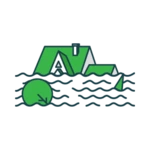
Stay Above Water With Flood Insurance
Do you want to pay for costly and common flood damage yourself or have an insurance policy pick up the tab?
For instance, rules state that your carrier should acknowledge your claim when you file one within 30 days. There’s no specific timetable for how long a claim takes, though, since every claim is different and the extent of damage and repairs can vary.
In addition, every insurer that doesn’t cover floods, earthquakes, mudflow, landslides, windstorms, or hail must notify you in writing in your policy. You’ll also find other company-specific rules and regulations on your policy pages that will vary by provider.
How to Get Home Insurance Quotes in North Carolina
Getting homeowners insurance quotes in North Carolina is easy with Clovered. You can compare several policies at once to find the right plan at the right price. We’re an experienced property casualty insurance company that has helped thousands throughout the country find coverage.
If you have questions or need any help along the way, our team of licensed agents would love to assist you. We’re available by phone at 833-255-4117 during business hours, or you can email us at agent@clovered.com. We’d be happy to assist you with your North Carolina homeowners insurance quote.
One of the best ways to find the right homeowners policy is to use an insurance agency in North Carolina. There are two types of insurance agents. A captive agent works for a provider and will only offer coverage options from that one company. On the other hand, an independent agent isn’t tied to working with a sole carrier. Once you give them enough information, they can look around for you among several companies to find the best policy for you.
Independent insurance agents have region-specific knowledge, insight, and experience to help you find the right policy for your needs. Clovered is an independent insurance agency. We partner with many of the best home insurers in the Tar Heel state. If you have any questions when using our online quoting platform, our team of North Carolina insurance agents is on standby, ready to help you resolve your issues and secure the right coverage.
What to Know About Mobile Home Insurance in North Carolina
North Carolina has some of the highest percentages of mobile homeowners in the country, with estimates concluding that over one in ten housing units are mobile or manufactured homes. These dwellings need a different type of insurance coverage than traditional homes.
Mobile and manufactured home insurance in North Carolina is satisfied through what’s formally called an HO-7 policy, which differs from the common HO-3 policy for single-family homes.
Some insurers will willingly cover mobile homes in North Carolina, while others may not, so it may take some extra shopping around to find the right carrier.
The editorial content on Clovered’s website is meant to be informational material and should not be considered legal advice.
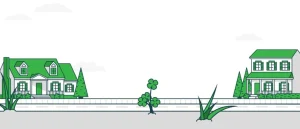
 Average Cost of Homeowners Insurance in North Carolina
Average Cost of Homeowners Insurance in North Carolina 